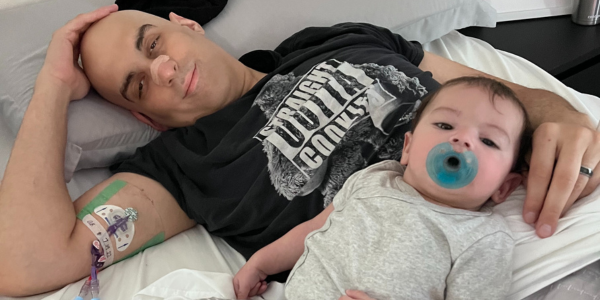REMOVING BARRIERS TO TREATMENT: Robert’s Story
Port Washington, WI
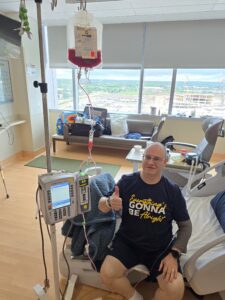 Bob’s world was shattered when he was diagnosed with blood cancer. He was already working two jobs to shoulder the financial burdens that included prior medical debt. His diagnosis forced him to stop working, and the looming bone marrow transplant meant he would be out of work for months.
Bob’s world was shattered when he was diagnosed with blood cancer. He was already working two jobs to shoulder the financial burdens that included prior medical debt. His diagnosis forced him to stop working, and the looming bone marrow transplant meant he would be out of work for months.
In this critical moment, the Icla da Silva Foundation became a lifeline, stepping in to keep the lights on.
Support extended even further, providing funds for Bob to stay at Kathy’s House – a haven near the transplant center crucial for his recovery.
Bob told us that he was so grateful for the extra help. “I never wanted to ask, but the social workers convinced me. This had made all the difference.” With their worries eased, Bob can focus on his battle, and a chance to fight for his future and his family.
Bob’s t-shirt says it all, ‘Everything’s Gonna be Alright.’
We wish him a full recovery following his bone marrow transplant.
Your support can offer a family like Bob’s a fighting chance in their battle against blood cancer. Please consider making a donation that funds critical needs like lodging, meals, and transportation while a patient is in treatment to receive a bone marrow transplant.
Written by: Bret Itskowitch
Helping a New Father Fight Blood CancerREMOVING BARRIERS TO TREATMENT: Haitham’s Story
Palatine, IL
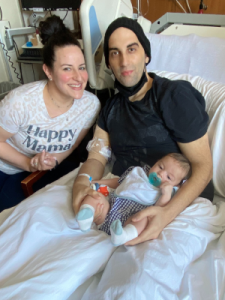 Recently, Haitham’s world overflowed with joy. He and his wife Nicole welcomed their first child, a beautiful baby boy.
Recently, Haitham’s world overflowed with joy. He and his wife Nicole welcomed their first child, a beautiful baby boy.
Two months later, their excitement was shattered by devastating news.
A Life-Threatening Diagnosis
Haitham just wasn’t feeling right. He was struggling with fatigue and joint pain for months. Red spots suddenly appeared on his body. His wife is a Dental Hygienist; when she noticed that his gums were swollen and bleeding, she demanded he visit urgent care to get blood work.
The blood tests revealed crushing news, this new father was diagnosed with acute myeloid leukemia (AML). He was recommended to receive a bone marrow transplant.
A Grueling Financial Burden
With a newborn baby at home, the physical, emotional, and financial burden of blood cancer felt insurmountable.
Haitham had not been able to work since his diagnosis. He could barely stand from the fatigue. His wife Nicole was ready to return to work following maternity leave. But now with the transplant coming, she had to switch to a part-time schedule to be his caregiver.
“Things were very difficult for me and my wife,” Haitham recalls. Just as they were on the brink of losing their home and car, a social worker at Northwestern Memorial Hospital, connected them with the Icla da Silva Foundation.
Giving Him A Fighting Chance
Through the Icla Cares program, we provided funds to ensure they could afford housing and transportation while he underwent a bone marrow transplant.
Thanks to our donors, we provided support at a critical moment in their battle against blood cancer. The grant helped keep a roof over their head and maintain their only vehicle while he was in treatment. “It gave me peace of mind,” Haitham says, “knowing we wouldn’t lose everything.”
The transplant was successful. Haitham is currently in remission and slowly recovering.
He is not yet able to return to work, but he is strong enough to care for their son while his wife is at work. We wish him a full recovery and many cherished years with their baby boy.
You Can Help
The Icla da Silva Foundation offers support and hope for a family in their battle against blood cancer. For a patient in financial crisis, we provide grants for meals, transportation, and housing while they are in treatment to receive a bone marrow transplant.
Your support empowers a patient like Haitham to focus on healing. Your donation will ensure a family has the resources they need to fight a life-threatening battle.
Please donate today.
Written by: Bret Itskowitch
No One Expects to Receive a Blood Cancer DiagnosisREMOVING BARRIERS TO TREATMENT: Cindy’s Story
Hope, ID
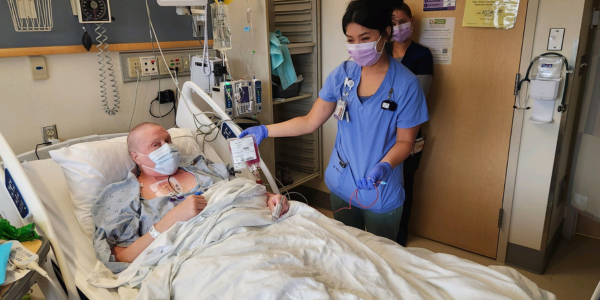
Cindy and her husband were enjoying retirement, but their golden years were threatened when she was diagnosed with acute myeloid leukemia (AML). The only path to a cure was a bone marrow transplant, a long and arduous therapy that carries a high risk of complications. The news overwhelmed Cindy and her husband, but she was determined to fight.
Following her diagnosis, Cindy spent two critical months in the hospital.
After being approved for a transplant, they had to relocate to Seattle. Treatment is intensive and bone marrow transplant patients are required to stay within 30 miles of the transplant center in case of complications.
Her husband packed up their dog Murphy and moved in with family to be closer to the Fred Hutchinson Cancer Center.
It was a scary, challenging time. Battling her disease was compounded by the stress of mounting expenses. No one plans to receive a diagnosis of blood cancer. As a couple on a fixed retirement income, the added cost of housing, transportation, and meals while in treatment was a lot to take on. How would they get through this?
That’s when the Icla da Silva Foundation stepped in. Thanks to the generosity of donors, we provided critical funds for transportation and meals during treatment.
Cindy was grateful for the support she received.
“The assistance helped us stress less about all the bills and focus more on getting well. Having cancer is stressful enough. It’s wonderful knowing that there is an organization like the Icla da Silva Foundation to lessen the burden.”
Her transplant was successful and we wish Cindy a full recovery.
Will you help a patient like Cindy as they battle a life-threatening blood cancer? Your donation will give them hope and strength to face each day.
Please donate today.
Written by: Bret Itskowitch
Her Brother is Her HeroREMOVING BARRIERS: Mackenzie’s Story
Hoboken, New Jersey
 After having dinner with some friends, Mackenzie developed stomach pains. Could it have been something she ate? The pain was so intense that she had to visit Urgent Care.
After having dinner with some friends, Mackenzie developed stomach pains. Could it have been something she ate? The pain was so intense that she had to visit Urgent Care.
They recommended an over-the-counter acid blocker. It was probably gastritis.
But the pain didn’t go away. A few weeks passed, and eventually, she ended up in the ER.
After several rounds of bloodwork, they realized it wasn’t gastritis. Mackenzie was diagnosed with leukemia. The pain in her stomach was not from something she ate. The leukemia had spread to her stomach, which was very rare.
Chemo started immediately.
Unfortunately, it caused a reaction that put her in the ICU. Those first 34 days in the hospital were scary. Eventually, Mackenzie received full body radiation, followed by another stay in the ICU, and then a bone marrow transplant.
Obviously, no one expects to face a life-threatening disease. She went out for dinner with friends, and one month later, she was battling for her life.
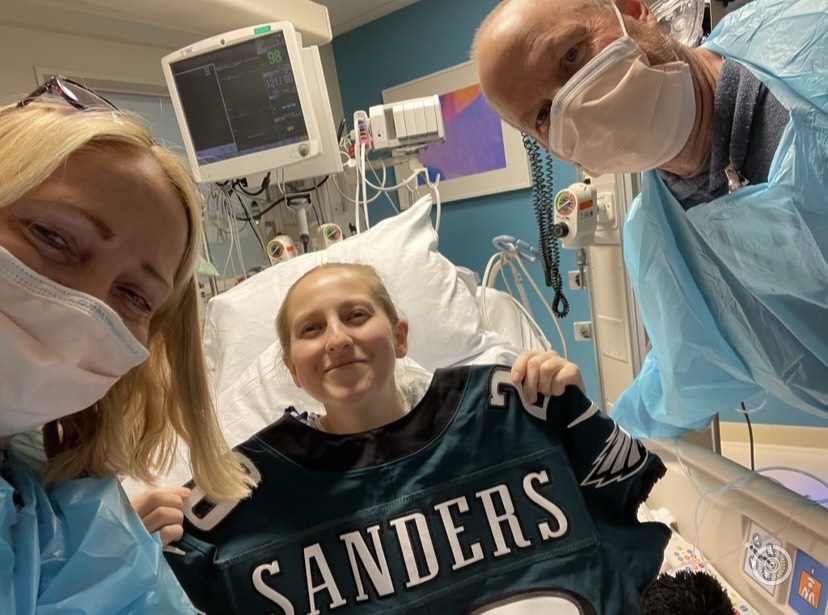 Still Fighting but Full of Gratitude
Still Fighting but Full of Gratitude
Mackenzie comes from a loving, close-knit family. She has a wonderful circle of friends. They were all affected by her diagnosis and she is grateful for the love and support she received from each of them while she fought leukemia.
They were constantly sending her messages and positive thoughts to keep going. Mackenzie insists she would not have gotten through treatment without their support.
She is also thankful for the support she received from the Icla da Silva Foundation.
IclaCares Helps Patients in Their Time of Need
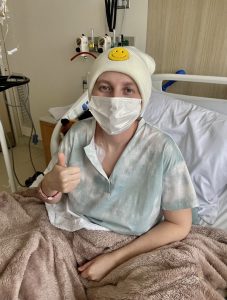 One month before that dinner with friends, Mackenzie lost her dream job due to a corporate layoff. Just like you and me, she was concerned about her finances, but she knew she would bounce back. She relied on savings while searching for a new job. But after a critical diagnosis, and a month in the hospital, Mackenzie was more worried about how she would get through this.
One month before that dinner with friends, Mackenzie lost her dream job due to a corporate layoff. Just like you and me, she was concerned about her finances, but she knew she would bounce back. She relied on savings while searching for a new job. But after a critical diagnosis, and a month in the hospital, Mackenzie was more worried about how she would get through this.
The Icla da Silva Foundation provided financial support for Mackenzie during her treatment.
I was already worried about just making it day-to-day…it was such a huge relief to have some financial support…and even the emotional support, always checking in on me.” -Mackenzie S.
She told us, “It is so helpful knowing that I have a community that is worried about me and wants me to get better. I am really appreciative of you.”
Mackenzie is grateful for all the support she received, from her family, her friends, and the Icla da Silva Foundation.
But one person stands above the others.
Her Hero
Mackenzie is truly grateful for her older brother Mike. He is her hero for donating his bone marrow and saving her life.
“I wouldn’t be here without my brother.” Mike was a 100% match for her bone marrow transplant and she will be forever thankful.
Mackenzie is in recovery but still fighting. The treatments wiped out her immune system and the new cells from her brother are working hard to repopulate and create healthy cells in her body. There are still regular chemo treatments and spinal taps to ensure no leukemia is hiding in her spine.
We are grateful that Mackenzie shared her personal story with us. We will keep in touch with her and we wish her a full recovery.
You Can Help
Many patients struggle to afford everyday expenses like food, transportation, and housing while in treatment to receive a bone marrow transplant. The IclaCares program works to get those patients the help that they need.
“When you are in treatment, the last thing you want to think about is how am I going to pay my rent.”
By donating, you can ensure that a patient has the basic necessities while they are in treatment.
Your gift will assist a patient like Mackenzie.
Please donate today.
Written by: Bret Itskowitch
Watch this brief video of Mackenzie sharing her story.
Assisting the Patient Caregiver ExperienceLas Vegas, Nevada
Every family experiences great difficulty while their loved one battles a life-threatening disease. So many lives are thrown into turmoil once a diagnosis is revealed.
In addition to heart-wrenching concerns and fear, many struggle with the financial pain of keeping it all together.
This is the story of one patient’s family.
Diagnosis and Treatment
Luis was diagnosed with acute myeloid leukemia (AML).
His only hope for a cure was a bone marrow transplant. But he lived in Las Vegas where there is no transplant center, so he had to travel to Southern CA to receive care and prepare for his transplant.
Although his family comes from a modest background, they made it work for several months. Unfortunately, medical complications ensued, and they eventually exhausted their savings.
Luis’ wife Madelourdes remained with him as his caregiver.
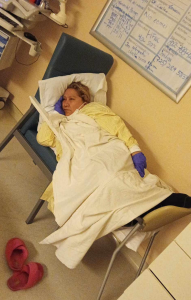 The Caregiver Requirement
The Caregiver Requirement
Every transplant center requires a 24/7 caregiver to help a patient during treatment and transplant. It’s required by the medical team, but the expenses are not covered by many patients insurance. The cost of housing, transportation, and meals became too much for Luis’ family.
Their only source of income came from their daughter, who was living in Las Vegas. As a single mom working two jobs, she did the best she could.
Luis’ wife slept on two chairs at her husband’s bedside.
Assisting with Lodging and Meals
The Icla da Silva Foundation assists bone marrow transplant patients and their families during a very difficult time. Through our IclaCares program, we were able to provide funds to Luis’ family for lodging and meals.
The family will use the lodging funds sporadically so his wife and caregiver Madelourdes can get a decent night of sleep and a shower every once in awhile while her husband completes treatment.
As soon as they received the news, the family called us with tears of joy. They were overwhelmingly grateful for the support we provided.
We wish Luis a full recovery.
We were happy to help this family. We only wish we could do the same for more families in their urgent time of need. No one should have to sleep between two chairs while their loved one battles a life-threatening disease.
You Can Help
Your donation will make a difference to a patient family in desperate need. Every gift, no matter the size, will help a family who has a loved one on the difficult path to receive a bone marrow transplant.
Please consider making a donation to help a patient family like Luis’.
Thanks for reading.
Written by: Bret Itskowitch
Supporting a Teenager on his Journey to a Bone Marrow TransplantREMOVING BARRIERS: Jake’s Story
Columbia Station, Ohio
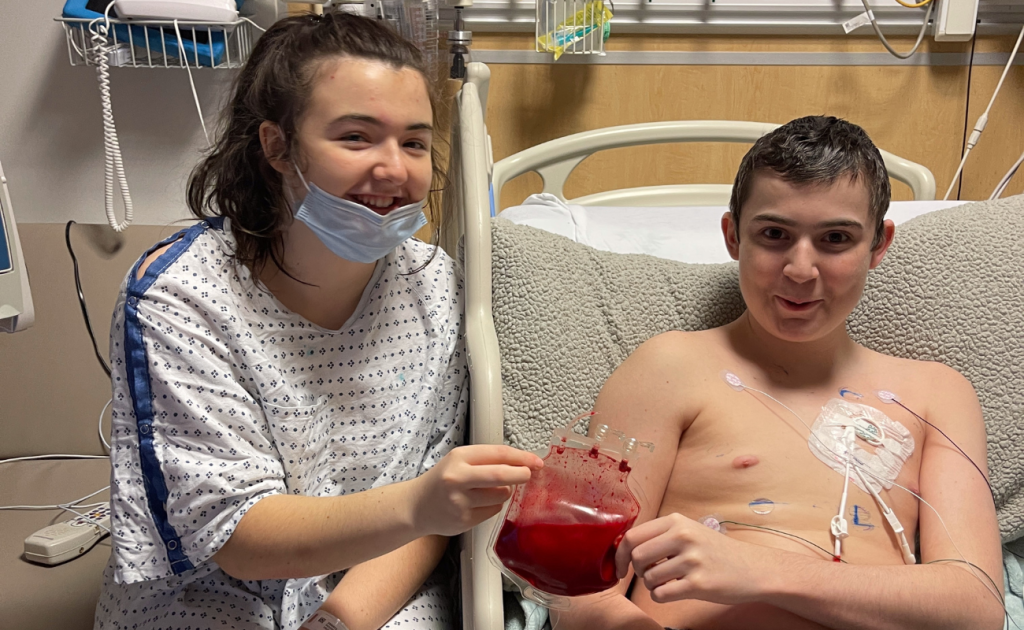
Meet Jake and his sister Bella.
Jake is a brave boy who fought a difficult journey with acute myeloid leukemia (AML). After being diagnosed with this aggressive form of blood cancer, he received treatment and went into remission. But then he relapsed and urgently needed a bone marrow transplant.
Luckily, his younger sister Bella was a matching donor, and Jake received a transplant.
Throughout treatment, Jake and his family faced many hardships. These included the financial strain of his mom having to stop working, and the need to stay at a Ronald McDonald house to be close to the hospital.
During recovery, Jake experienced painful mucositis that made it hard for him to eat.
Thanks to the IclaCares program, Jake and his family received much-needed assistance with meals and groceries. Your support helped reduce some of the stress and allowed them to focus on Jake’s recovery.
Join Icla Cares by Supporting Patients and Their Families
 Jake is still in recovery.
Jake is still in recovery.
He just celebrated his 16th birthday. We wish him many healthy, Happy Birthdays in the years ahead.
You can make a difference in the life of a patient like Jake by making a donation.
Your gift provides critical assistance, including meal support during treatment. Help us continue to provide comfort and support to a patient on their journey to receive a bone marrow transplant.
Thank you.
Written by: Bret Itskowitch
PATIENT UPDATE: We love to see a patient smileBurlington, Vermont
We just received an update from a recent patient. Kristina is a single mother who was diagnosed with AML and needed support traveling out-of-state to receive her treatments.
We removed that barrier and she recently reached out with an update:
“Airam,
My sons and I were able to get out in the new snow up north during school break to do some sledding. This is the 1st time we’ve revisited this tradition since before I got sick with AML!!!
Memories made!
-Kristina
Click and watch the 0:08 video below. Listen to her laughing!!
You can make more patients smile on their journey to a cure. Please donate today.
Read our first story about Kristina, and watch her video talking about the importance of the support she received using this link.
She Passed Out in the ERREMOVING BARRIERS – LANEATER’S STORY
Longview, Texas
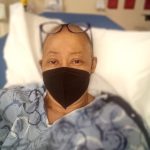 Laneater Johnson was working from home; she didn’t feel well all morning. On her first break of the day, she had chills that made her shake uncontrollably. She realized she had a fever, so she took some Tylenol and decided it was best to go to the emergency room.
Laneater Johnson was working from home; she didn’t feel well all morning. On her first break of the day, she had chills that made her shake uncontrollably. She realized she had a fever, so she took some Tylenol and decided it was best to go to the emergency room.
She knew something wasn’t right; maybe it was a urinary tract infection.
After the triage assessment they give you when you visit the ER, they sent her to the waiting room to wait for a doctor, but she passed out.
Laneater was rushed to undergo all kinds of tests. They didn’t know what was wrong. She was right about having an infection, her body was septic. When the results came back, she was diagnosed with AML (acute myeloid leukemia).
She was immediately transported to Medical City Dallas to undergo 45 days of intense chemotherapy treatment.
A Long Process
She went through a long process that included many inpatient visits for continued tests and chemotherapy. Those treatments went on for about a year before they determined that she needed a bone marrow transplant.
 There were no matching donors for her on the national registry, so they tested her siblings and her children.
There were no matching donors for her on the national registry, so they tested her siblings and her children.
Everyone in the family was a half-match, but her youngest daughter represented the best possible match.
In June 2022, Laneater received a blood stem cell transplant from her daughter.
Removing Barriers
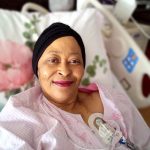 Laneater was not able to work since that very first visit to the emergency room. Even after finally receiving her bone marrow transplant, she still couldn’t return home.
Laneater was not able to work since that very first visit to the emergency room. Even after finally receiving her bone marrow transplant, she still couldn’t return home.
Since she lived more than 50 miles from the transplant center, she was required to stay nearby for continued monitoring until the hematologist released her.
Fortunately, she was released soon after.
The Icla da Silva Foundation supports patients undergoing a bone marrow or cord blood transplant. Our Icla Cares program removes barriers to treatment with emotional, logistical, and financial assistance during treatment.
Thanks to the generosity of our supporters, we were able to help Laneater with a small grant to offset lodging expenses while receiving follow-up treatment at Medical City Dallas. Her stay was shorter than expected, but that didn’t stop Laneater from showing how grateful she was to receive assistance.
“This support came when I was in dire need, I didn’t know where I was going to get the rest of the money.”
It has been a long journey, but her doctors say she is doing well. Laneater looks great, and she smiles as she tells us that she can’t wait for her hair to grow back.
Watch Laneater share her story
We have high hopes for her continued recovery.
Please consider supporting the mission of the Icla da Silva Foundation. Your donation will help more patients like Laneater. Your gift will support bone marrow patients with critical needs.
Together we will continue to make a difference.
Written by: Bret Itskowitch
Another Barrier Removed When No One Else Could Help
The Icla da Silva Foundation goes the ‘extra mile’ to ensure that another life is saved.
Young Herzel was inspired to become a nurse after surviving thyroid cancer in 2017. The remarkable care that she received as a patient impacted her greatly, and she enrolled in nursing school with a desire to help others.
But while preparing for her exam to become a Certified Dialysis Nurse, Herzel was diagnosed with Acute Myeloid Leukemia (AML).
A bone marrow transplant was her only chance for a cure, and there were no matching donors for her on the registry.
Finding a Donor
The bone marrow transplant team at New York-Presbyterian / Weill Cornell Medical Center acted fast to test her brother Reggie back in the Philippines as a potential donor.
Luckily, he was a 100% match.
However, this fantastic news still presented a barrier.
Herzel is a smart, hard-working young woman. Although she was unable to maintain her employment during so many visits and treatments at the hospital, she kept her living expenses low and paid her bills on time.
But the expense to bring her brother to the U.S., so he could transplant his stem cells, was unaffordable at the moment. Her savings had already been depleted.
She didn’t know what to do. Her doctors wanted to schedule the transplant as soon as possible.
No organization was able to fund international travel for her donor.
Removing Barriers
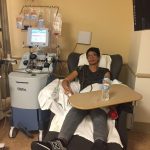 A social worker at New York-Presbyterian contacted the Icla da Silva Foundation. After gathering and organizing the necessary paperwork, and thanks to the generous supporters of the Foundation, not only did we provide the funds, we made the flight reservations.
A social worker at New York-Presbyterian contacted the Icla da Silva Foundation. After gathering and organizing the necessary paperwork, and thanks to the generous supporters of the Foundation, not only did we provide the funds, we made the flight reservations.
Within days, this life-threatening financial barrier was removed and Herzl’s brother arrived in New York for the donation. The transplant was successful and Reggie saved his sister’s life. They spent a few days together before he returned home to the Philippines.
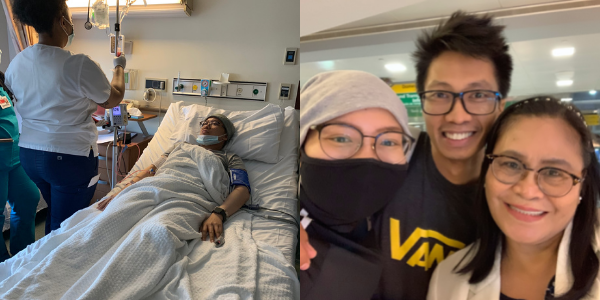 Giving Back
Giving Back
The gift of life that Herzel received only strengthened her desire to help others.
She passed her nursing exams and recently began working for the NYC Department of Health. Herzel is thankful for the support that she received and has applied to Volunteer for the Icla da Silva Foundation.
We asked Herzel what she would say to the donors who made her brother’s trip possible.
“I want to thank everyone for giving me this opportunity to live a healthy life again. I couldn’t be any more grateful for the Icla da Silva Foundation. I want to help the Foundation as much as I can so other patients like me can have the same opportunity for life.”
You can help us support more patients like Herzel. Your donation will remove barriers for patients needing a bone marrow or cord blood transplant.
Your donation will save lives.
Written by: Bret Itskowitch
Rhynett’s 2nd Battle With Cancer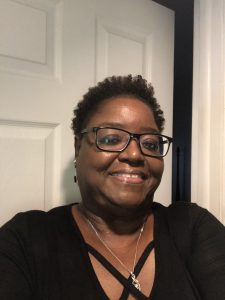 More than 25 years ago, Rhynett Chatman was diagnosed with cancer. She fought that battle and was fortunate to survive.
More than 25 years ago, Rhynett Chatman was diagnosed with cancer. She fought that battle and was fortunate to survive.
Now she is fighting cancer once again.
In May of 2017, she was diagnosed with Myelodysplastic Syndrome (MDS). MDS is a form of blood cancer which prohibits the body from producing enough healthy blood cells in the bone marrow.
Rhynett told us that she always felt tired, and she lost a considerable amount of weight. Despite chemotherapy and numerous blood transfusions, there was no improvement in her condition.
Most Recent Diagnosis
Recently, her diagnosis was changed to Acute Myeloid Leukemia (AML). There was a definitive overproduction of immature blood cells in her bone marrow. AML quickly gets worse if it is not treated immediately.
Doctors advised Rhynett that she would need a bone marrow transplant in order to survive.
Searching for a Match
For African American patients with various blood cancers like leukemia, finding a matching bone marrow donor is a difficult task. The chances of finding a match on the national registry are only 23%. There simply aren’t enough Black donors on the registry. For comparison, White patients have a 77% chance of finding a matching donor on the registry.
We are trying to change this unfortunate fact.
The Icla da Silva Foundation is the largest recruitment center for the Be the Match registry. Our efforts are focused specifically on adding more diversity to the list of potential donors.
We are trying to help Rhynett find a matching donor by holding donor drives. We share her story, explain the need, and provide details on joining the registry and donating stem cells if you match a patient in need.
Anyone between the ages of 18-40 can join the registry at no cost. If you match a patient, they don’t even use your insurance to perform the transplant. Be the Match takes care of everything.
To join the registry in support of Rhynett, please click this link:
Rhynett’s Search for a Donor
Unfortunately, there is no matching donor in her family. And there is no match for her on the national registry.
Not yet.
We are doing everything we can to share her story and enable more people to join the registry on her behalf.
Rhynett tells us that her body hurts. “I get tired easily. I have been receiving blood transfusions for months now…it’s all very overwhelming, but God is in control”.
She is grateful for the support of her friends and family. She is also thankful for her church family at the Northside Church of Christ in Jacksonville, Florida. She has been worshipping at Northside since she was 14 years old.
She Has Faith
Despite her battle with this life-threatening disease, Rhynett has faith that God will provide.
She enjoys reading, traveling, and singing. She has traveled and sung extensively, trying to be an encouragement and a blessing to the Brotherhood of her church. She loves singing and spreading the “Good News” through the gift that God has blessed her with.
 Rhynett sang for many years with her church group Total Praise, as well as the Northside Acappella Mass Choir.
Rhynett sang for many years with her church group Total Praise, as well as the Northside Acappella Mass Choir.
“Singing has always been the thing that kept me motivated and content. I miss it so much.”
Unfortunately, chemotherapy has affected her vocal cords.
Join the Registry
Please help us in Rhynett’s search to find a matching bone marrow donor. Join the registry. After clicking the link, follow the prompts to create an account and register to become a potential donor.
You can also help us spread the word by sharing Rhynett’s story.
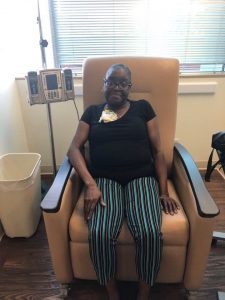
“I know if you can help in any way, you will. May God bless each of you for your kind hearts and loving spirits.”
-Rhynett Chapman
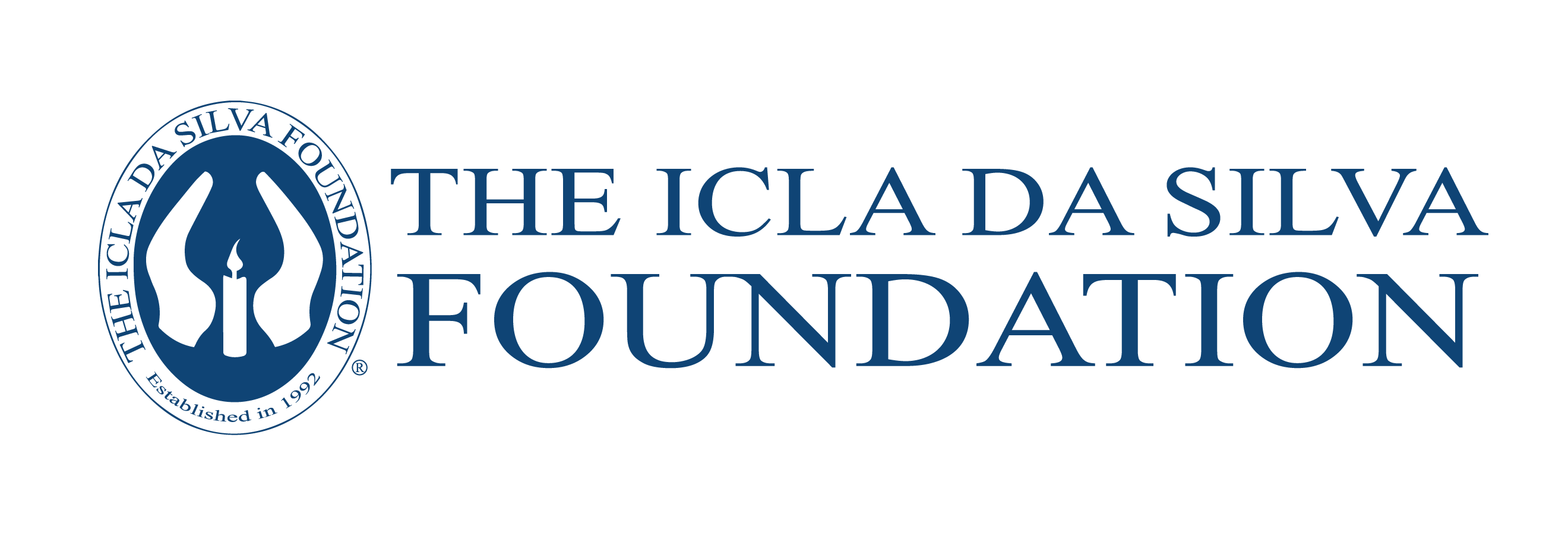
 English
English Spanish
Spanish Portuguese
Portuguese